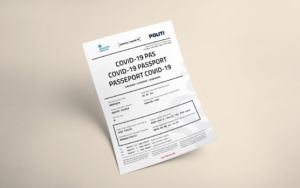News
Coronavirus Round-Up: Corona passport can make travelling easier
This article is more than 5 years old.
A new coronavirus passport makes it easier to travel. Meanwhile, travel during the summer holidays can lead to a new spike of COVID-19

You’ll need it to go out basically (photo: sundhed.dk)
The minister of health, Magnus Heunicke, has announced that Denmark can now issue digital COVID-19 passports.
There are several countries requiring a negative coronavirus test for entry. From now on, people in Denmark will be able to show an official travel document with a negative result. This is especially relevant for business travellers.
The chairman of the board of sundhed.dk, Lone Langballe, explained that the travel passport will make it easier for Danes to travel. “The COVID passport is a digital solution that will enable both Danish business travellers and tourists to cross borders during the coronavirus pandemic,” she said.
Downloadable and printable
The Ministry of Health and the Elderly, the Ministry of Foreign Affairs and the National Police validate the travel document.
Everyone can see, download and print their COVID-19 passport on sundhed.dk as soon as the laboratory has analyzed the sample and released the results. This only applies if the test is negative and is not older than 7 days.
The travel document is only available to adults over the age of 18 but children will also be able to get it from mid-July.
Travellers should check travel advisories on the websites of Danish embassies in their destination countries. The Ministry of Foreign Affairs’ monitoring center and local embassies can confirm if the official corona passport is required.
Tourism industry struggles with COVID-19 impact
The tourism industry faces significant economic damage and anticipates a “mixed” summer. The decrease in overnight stays has led to a loss of 4 billion kroner across the entire industry, according to an assessment of Dansk Industri. However, the gradual reopening of borders means that more German tourists will arrive. With 18 percent more bookings of holiday houses than at the same time last year, DI still predicts summer 2020 to yield mixed business prospects. DI said that it wanted the government to remove the requirement for incoming travellers to present proof of a booking of six nights, especially now that Denmark listed safe countries it will allow entry to.
Researchers warn corona infection can lead to brain damage
A study reported by Reuters showed that the coronavirus can lead to severe neurological complications such as inflammation, psychosis and fever. The study from the University College London reported temporary brain dysfunction, brain haemorrhage, nerve damage or other serious forms of brain damage among 43 patients with coronavirus. Lars Østergaard, professor and chief physician at the Department of Infectious Diseases at Aarhus University Hospital, confirmed that patients have been affected by memory loss and difficulty concentrating. Experts say viruses can completely penetrate the brain in rare cases.
Corona figures still low but summer holidays can cause new infections
The number of coronavirus patients on intensive care and using respirators in Denmark remains unchanged. The number of admissions increased by one to 18 on Wednesday, figures from Statens Serum Institut show. No deaths have been recorded. Allan Randrup Thomsen, professor of virology at the University of Copenhagen, believes that authorities have done well in controlling minor coronavirus outbreaks, as seen in Hjørring Municipality. However, he warned that people might bring the virus when they return home from summer holidays around Europe.










































